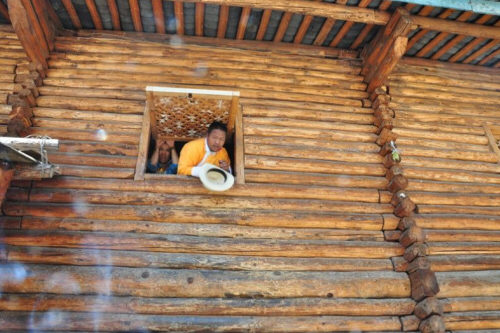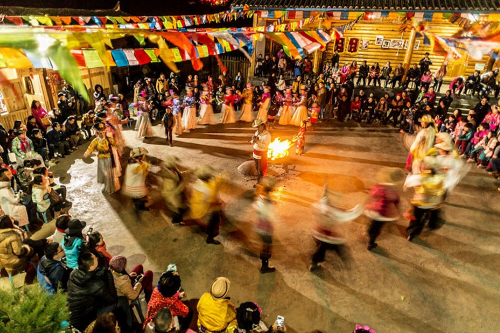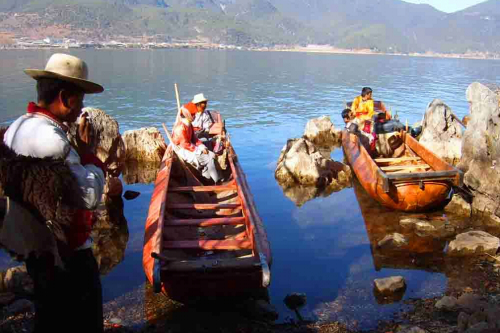Chinese Tribe Without Marriage Points to Future
无婚姻的部落预示未来世界
By Nigel Barber
文/奈吉尔·巴伯
The Mosuo people[1] of southwest China do not marry and fathers do not live with, or support, children. Do the Mosuo anticipate a global future where no one marries?
中国西南部的摩梭人男不娶、女不嫁,父亲不和子女同住,也无抚养之责。摩梭人是否预兆了全世界人人不婚的未来?
[1] the Mosuo people摩梭族在中国属于未识别民族,所以中国的56个民族中没有摩梭族。本文统译作“摩梭人”。
Whether the Mosuo have marriage depends upon what you mean by marriage. Their mating system is called “walking marriage[2]” where the man and woman do not live together even though they sleep together.
摩梭人是否有婚姻,取决于你对婚姻的定义。摩梭人的配偶制度叫“走婚”,男女双方夜晚同寝,白天各居自家。
[2] walking marriage 走婚

As soon as she is sexually mature[3], a young woman gets her own bedroom[4] and may invite a man to spend the night with her. If babies are produced from these informal unions, they are raised by the mother with the help of her siblings[5] and the father does not provide economic support.
女子成年后有自己的花楼,可以邀请男子过夜。这些非正式结合生下的孩子由兄弟姊妹协助女方抚养,生父不提供经济支持。
[3] sexually mature 性成熟。
[4] bedroom 花楼,即摩梭成年女性的房间。
[5] sibling 兄弟或姐妹。
So far, it might seem that this is no different from a women in a modern society having one night stands[6] and opting to[7] become pregnant as a result. Yet, walking marriages are not necessarily casual relationships[8]. In general, they seem to be long-standing arrangements that can even last for a lifetime.
说到这里,这似乎与现代社会女子一夜情后自愿孕产别无二致。然而,走婚未必是随意交往。总体而言,走婚像是一种长期契约,甚至可以持续终生。
[6] one night stand 一夜情。
[7] opt to do 选择做某事。
[8] casual relationship (尤指性方面)关系随意。
Moreover, Mosuo women generally know the paternity[9] of the children and the father is ceremonially[10] welcomed by children on special occasions, such as Chinese New Year. So, however minimal[11] they are, walking marriages include one key feature of other marriages, namely the joining of a kin[12] network.
此外,通常摩梭女子知道子女的生父是谁,子女在春节等特殊场合会按照礼节迎接生父。因此,不管走婚多么罕见,走婚至少包含了其他婚姻形式的一个主要特征,即维系家族血脉。
[9] paternity 父亲的身份
[10] ceremonially 礼仪性地;仪式上。
[11] minimal 极少的;极小的。
[12] kin 亲戚;家族。
What is conspicuously[13] missing is the economic support that married fathers around the world are expected to provide for their children in return for the opportunity of fathering children of the marriage.
结婚生子让男人尝到了为人父的滋味,全世界的已婚父亲理应供养子女,而在走婚中来自父亲的经济支持明显缺失。
[13] conspicuously 显著地。

The avunculate[14]
舅权
[14] avunculate 舅权。
How could such a seemingly unbalanced version of marriage come to exist? Anthropologists offer some clues because there are other societies where fathers invest little in[15] children of their marriage. Instead, they become attached to[16] children of their sisters – a phenomenon known as the avunculate.
这种貌似失衡的婚姻形态是如何产生的呢?人类学家提供了一些线索,因为还有一些社群,父亲对婚生子女几乎不投入财力。相反,男子对姐妹的子女宠爱有加,这种现象叫舅权。
[15] invest in 在......投入(时间、精力等)。
[16] be attached to 对......有依赖;喜爱。
The avunculate likely exists because a husband’s confidence of paternity of children of the marriage is low. Whether this is true of the Mosuo is unknown.
舅权之所以存在,很可能是因为丈夫不大相信自己是孩子的生父。摩梭人的这种情况是否如此我们不得而知。
Apart from low confidence of paternity, there is another good reason that men (and women) might choose to care for their nieces and nephews as though they were offspring. It might be a response to the difficult living conditions of the Himalayas. After all, such conditions in Tibet may be responsible for the very unusual marriage system of polyandry[17] where a pair of brothers shares a bride.
除了不大相信自己是孩子的生父外,另一个充足的理由是男子(还有女子)可以选择照顾外甥和外甥女,视他们如己出。这也许是为了应对喜马拉雅山脉恶劣的居住条件。毕竟,可能是西藏这样的条件导致了兄弟共妻的一妻多夫的独特婚姻体制。
[17] polyandry 一妻多夫制。
Yet another possible reason for walking marriage is that Mosuo men used to be long-distance traders who were absent for long periods in trading caravans[18].
走婚的另一个原因可能是过去摩梭男子常常长途跋涉,久居在外,赶马经商。
[18] caravans(穿过沙漠地带的)旅行队或商队。此处特指摩梭人跟随马帮外出赶马的习俗。
What it means for the future
这对未来意味着什么
Modern marriage may be converging[19] on the Mosuo tradition in the sense that formal marriage may well be on the way out. The key data point here is the fact that in some developed countries, the majority of children are already born outside marriage in a fast-developing trend.
正式婚姻很可能在走向没落,从这一意义上说,现代婚姻也许在向摩梭人的传统靠拢。一些发达国家的大部分孩子已属非婚生子女,该趋势发展迅速,这一事实是关键数据点。
[19] converge 聚集;交汇。
One of the key practical factors today is that mothers are financially much more independent than was true in the past thanks to near-universal[20] participation in the paid labor force. Another is that women have remarkably small families of just one or two that they may be able to raise independently particularly if they live in a modern welfare state with extensive government supports for children and aggressive[21] collection of maternity payments[22].
几乎所有的母亲都从事有偿劳动,因此在经济上比过去更加独立,这是当今一大重要的现实因素。另一大因素是妇女只有极少的一两个孩子,尤其是如果她们生活在现代福利国家,政府会为育儿提供广泛资助,母亲可以领取可观的产假工资,在这种情况下她们可以独立抚养孩子。
[20] near-universal 极为普遍的;几乎所有的。
[21] aggressive 积极进取的;有闯劲的。
[22] maternity payment 产假工资。

So the Mosuo may either be one of those strange historical holdovers[23] – a marginal group occupying a marginal ecology. Or they may offer a revealing[24] glimpse into the future in which formal marriage suddenly disappears.
因此,摩梭人或许是奇特的历史遗存之一——一种构成边缘生态的边缘群体。他们或许可以让我们见微知著地窥见未来,那时候正式婚姻会突然消失。
[23] holdovers 残余;遗物。
[24] revealing 发人深省的。
(译者曾获第四届“《英语世界》杯”翻译大赛优秀奖。)








